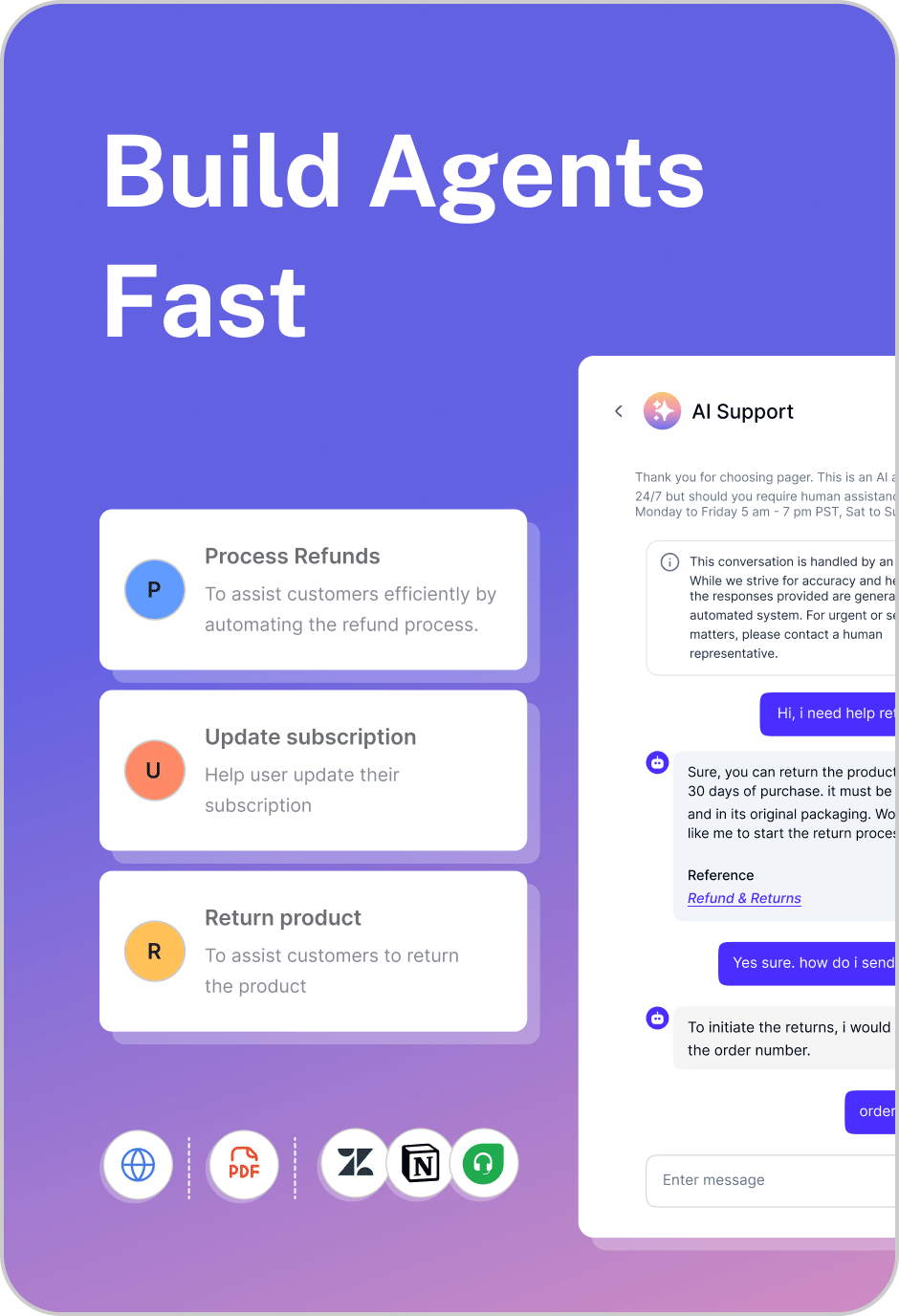
Tidio Reviews 2025: Features, Pricing, Strengths & Best Alternative
Explore our 2025 review of Tidio: features, pricing, strengths, and limitations. Learn why businesses choose AI-first alternatives like pagergpt for faster, simpler, and more accurate customer support.
The AI customer support space is more crowded than ever. From specialized AI agents to full-scale automation platforms, businesses today have no shortage of tools to choose from. But with this abundance comes a tough question: which AI solution actually fits your business needs?
Tidio has consistently appeared on the radar of small and medium businesses, praised for being simple, accessible, and budget-friendly. But does Tidio really live up to the hype in 2025—or has the market moved past its strengths? In this detailed review, we’ll dive deep into Tidio’s features, benefits, limitations, pricing, and positioning. By the end, you’ll have a clear picture of whether Tidio is your best choice—or if alternatives like pagergpt or others may serve you better.
What is Tidio?
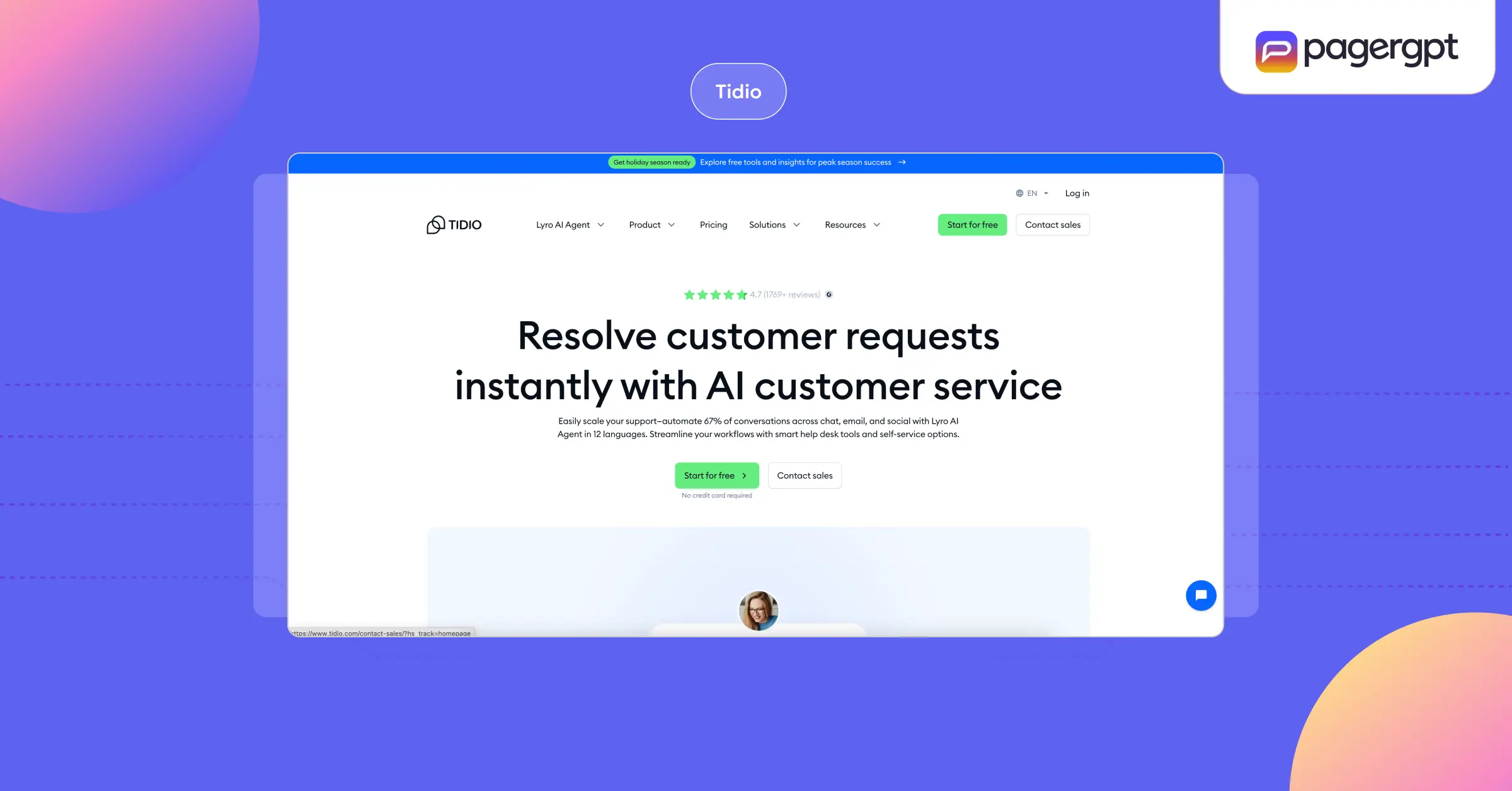
Tidio is a unified customer experience platform that combines live chat, helpdesk, and AI-powered automation into one simple package. What sets it apart in the crowded AI landscape is its emphasis on being accessible and easy to deploy, making it especially appealing to small and medium-sized businesses (SMBs) that don’t have dedicated developer teams.
At the core of Tidio’s offering is its Lyro AI Agent—a multilingual chatbot trained to understand customer queries, resolve them instantly, and even escalate complex issues to human agents. For businesses that want to offer 24/7 customer support without the overhead of hiring large support teams, this AI agent acts as a scalable and affordable solution.
Customer experience (CX) leaders often highlight Tidio because it offers:
Quick setup and onboarding, ideal for non-technical users.
Affordable and transparent pricing, which is rare among AI platforms.
Multilingual support, a crucial feature for businesses operating across borders.
However, Tidio isn’t without its caveats—especially when it comes to advanced enterprise-grade features or customization. And that’s what we’ll explore in the rest of this 2025 review.
Tidio Reviews: What users are saying in 2025
Customer expectations are evolving fast, and businesses are turning to AI chatbots to deliver instant, round-the-clock support. Among the many platforms available, Tidio has gained attention for being simple, flexible, and affordable especially for small and medium businesses. But with so many alternatives in the market, does Tidio really suit your business needs in 2025? This review explores the good, the bad, and the practical realities of using Tidio as your customer support AI.
Easy and flexible to customize
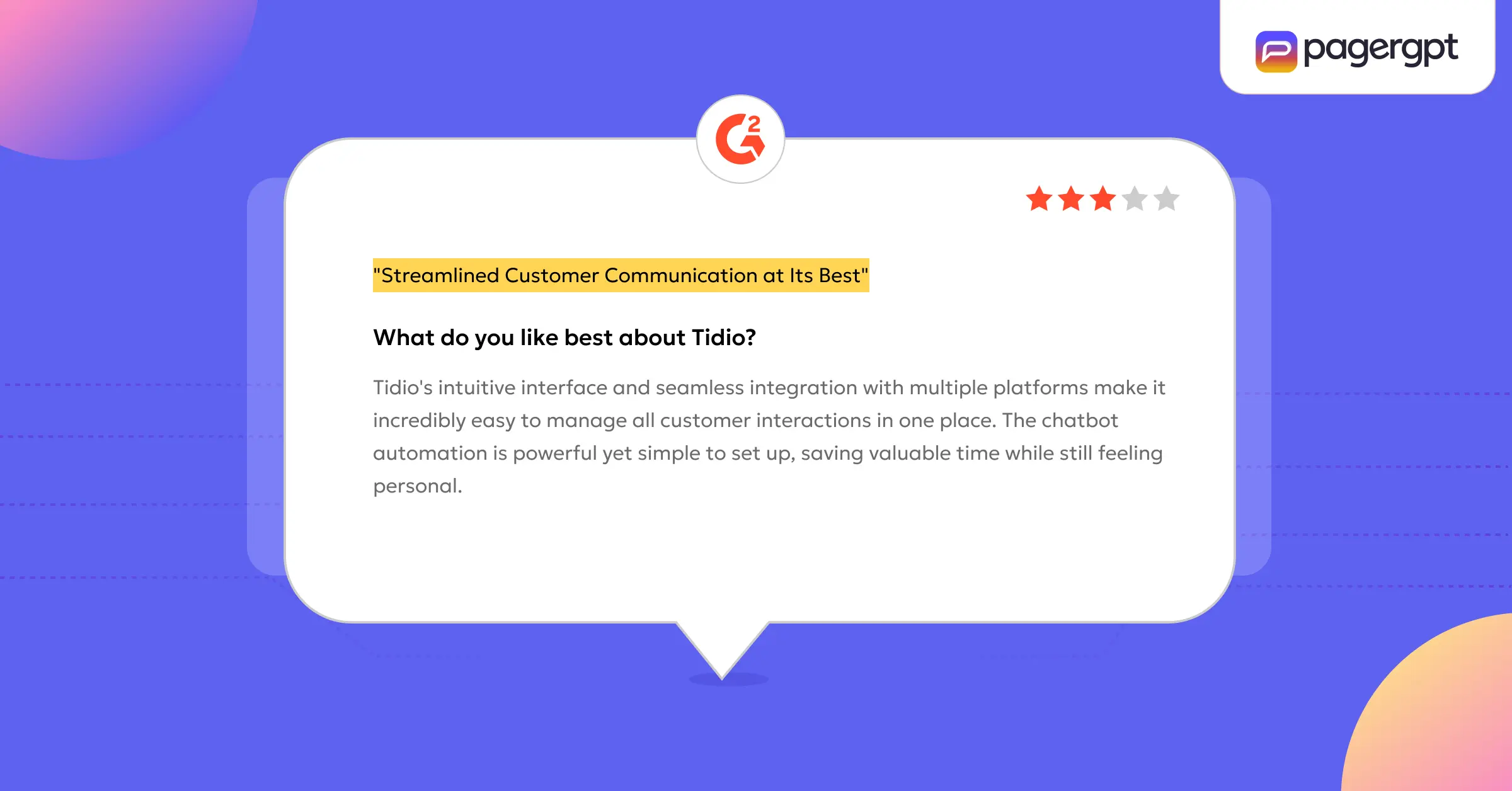
Tidio is praised for its easy-to-use interface and unique flexibility, highlighting how simple it is to create different types of chatbots tailored to specific support needs. The ability to design automation workflows without coding stood out, giving their team the freedom to strengthen customer support while keeping operations streamlined. Tidio is valued as a versatile tool for businesses that want both simplicity and customization.
Easy chatbot deployment
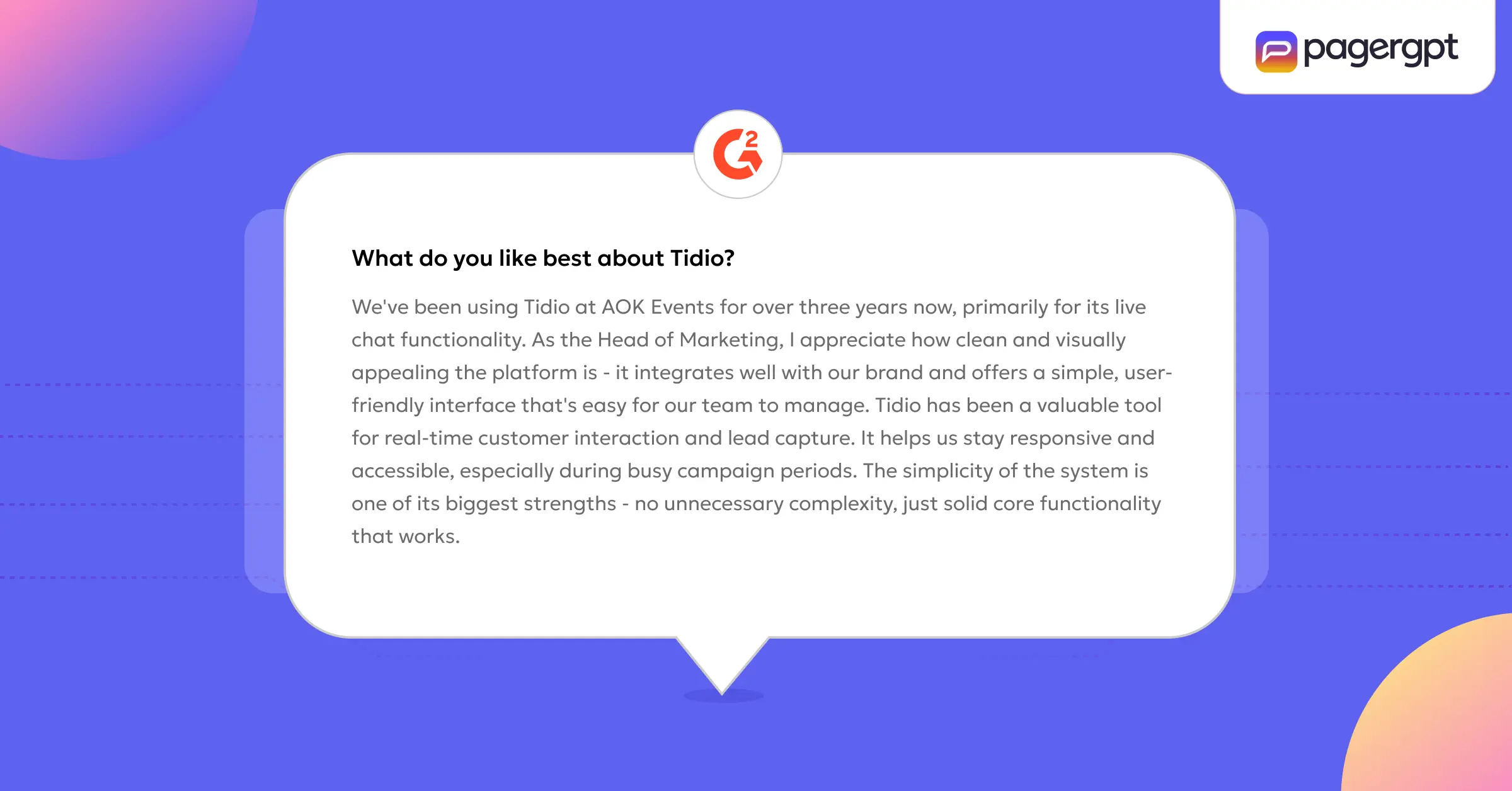
Tidio makes it simple to build different types of chatbots tailored to their support needs. The no-code setup stood out, allowing their team to quickly design automation workflows that improved efficiency without technical barriers. This shows Tidio’s real strength as an accessible and flexible chatbot builder for businesses that want speed and customization in one package.
A reliable boost to customer support
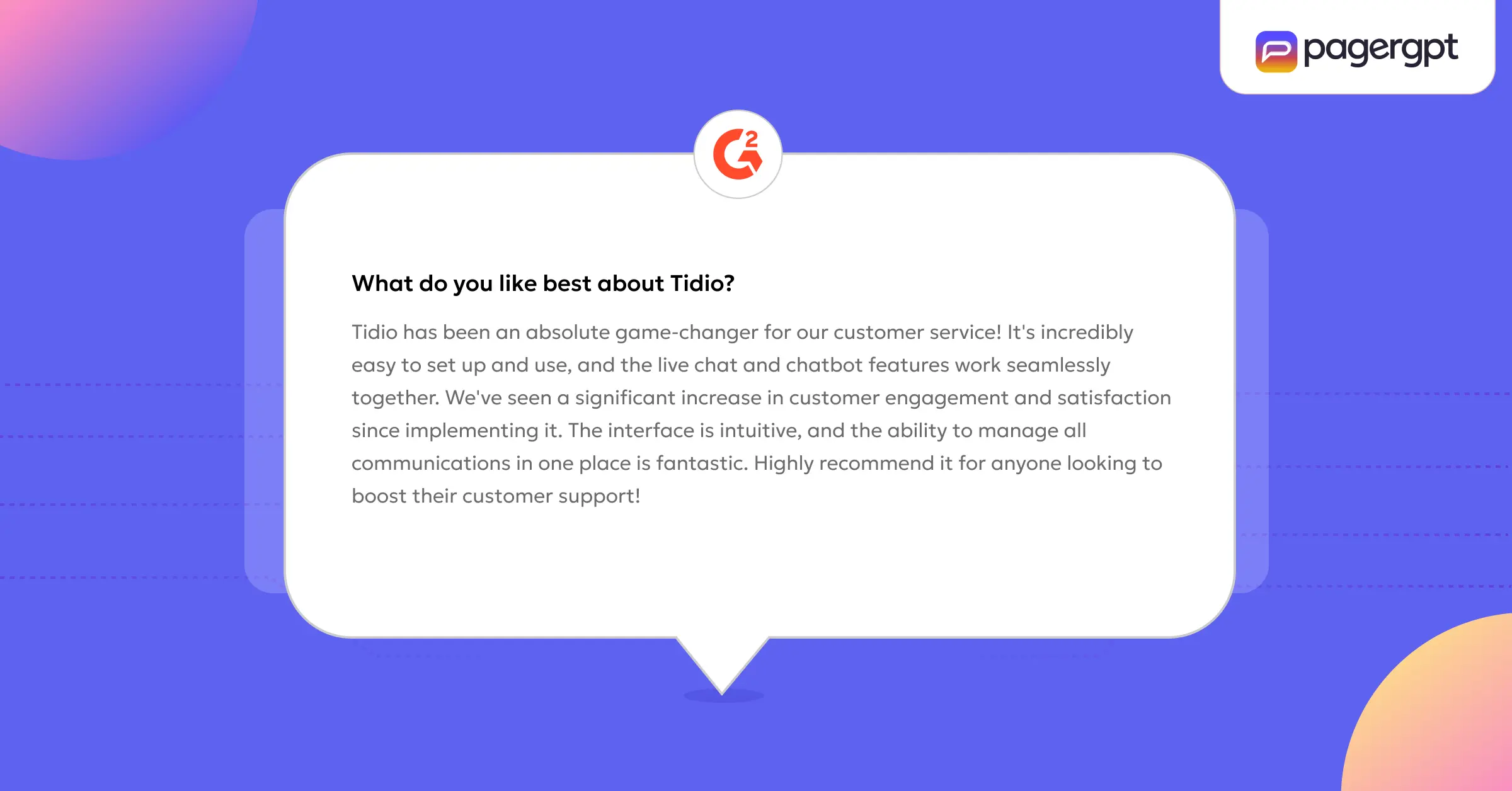
Tidio proves to be a powerful tool for businesses that want to strengthen customer service without unnecessary complexity. Its combination of live chat and chatbot features works seamlessly, making it easy to engage customers in real time while automating repetitive questions. The setup is straightforward, the interface is intuitive, and the ability to manage all communication channels in one place streamlines support operations. For companies looking to improve customer satisfaction and efficiency, Tidio delivers a reliable, all-in-one solution.
Flexible for marketing support
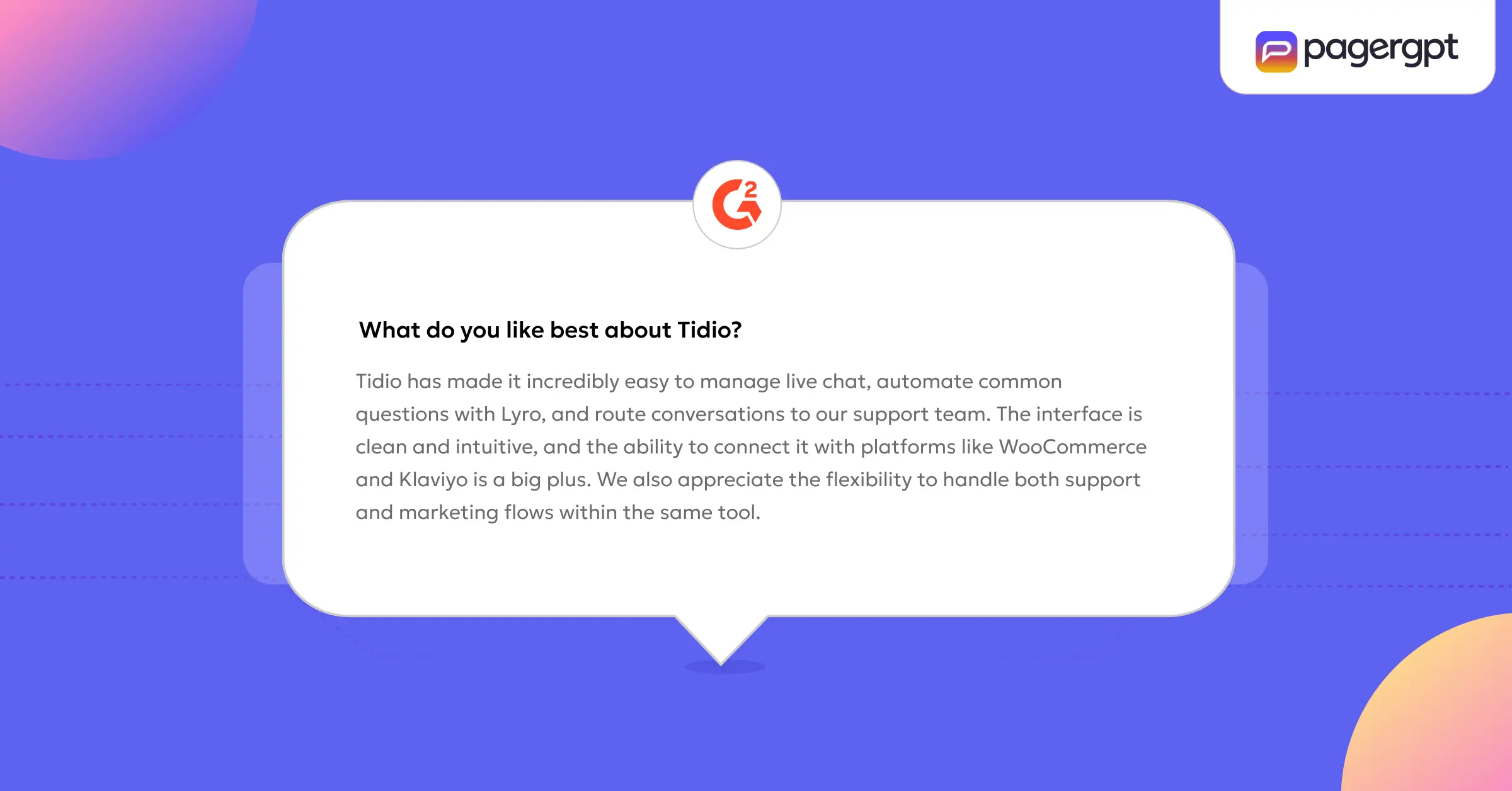
What stands out most about Tidio is how easy it makes managing live chat and automating common questions with Lyro. The clean, intuitive interface ensures our team can pick it up quickly, while the ability to route conversations directly to support keeps customer interactions seamless. Integrations with platforms like WooCommerce and Klaviyo add extra value, making it possible to connect support with marketing campaigns. The flexibility to manage both customer service and marketing flows in a single tool makes Tidio a strong choice for growing businesses.
Limited stronger integrations
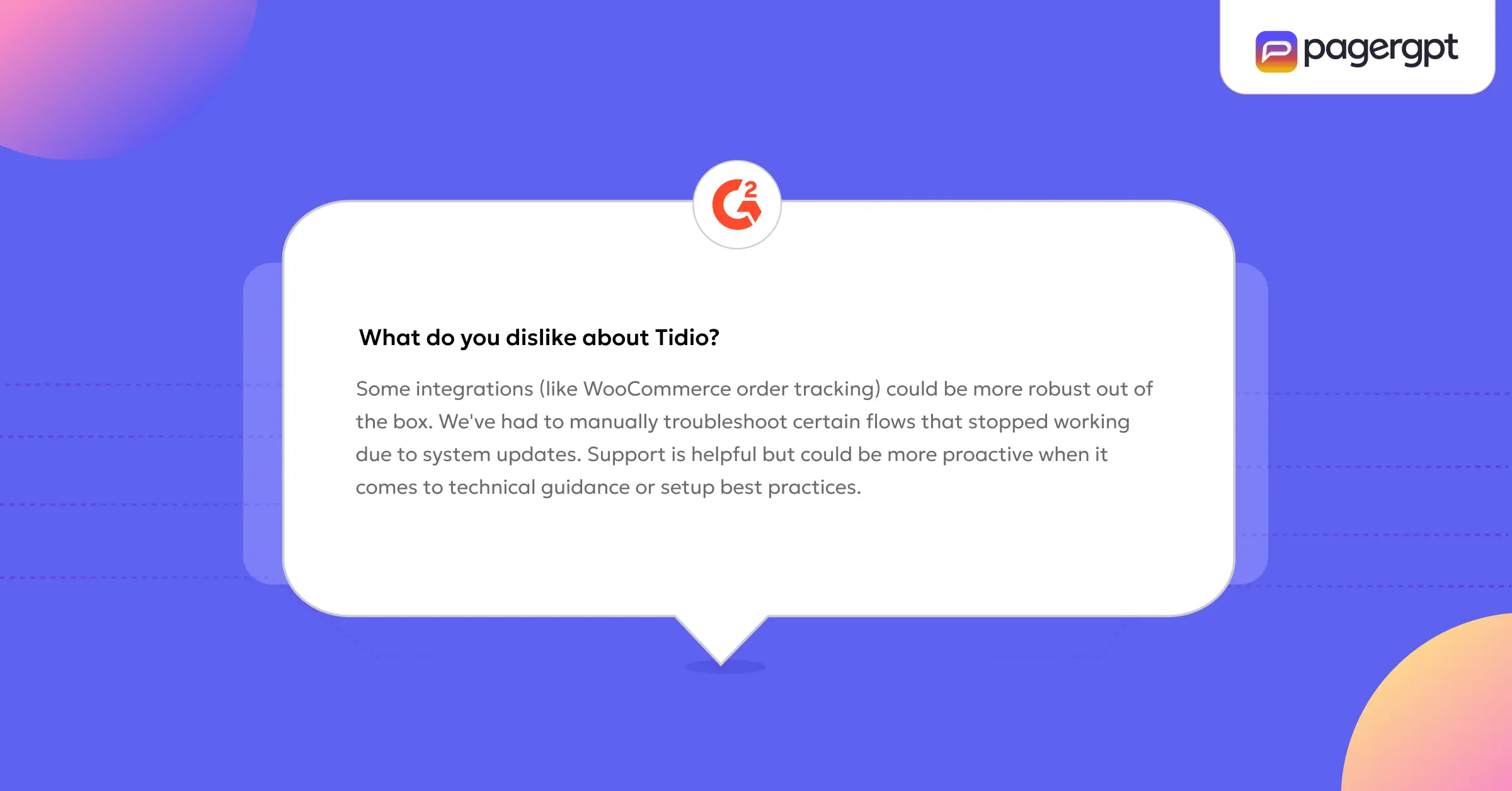
While Tidio provides helpful features overall, some integrations—like WooCommerce order tracking—could be more robust right out of the box. We’ve had to manually troubleshoot certain flows when system updates caused them to stop working. The support team is responsive, but more proactive guidance and setup best practices would make the experience smoother. Tidio works well for basic needs, but technical reliability and integration depth still leave room for improvement.
Higher-tiered plans
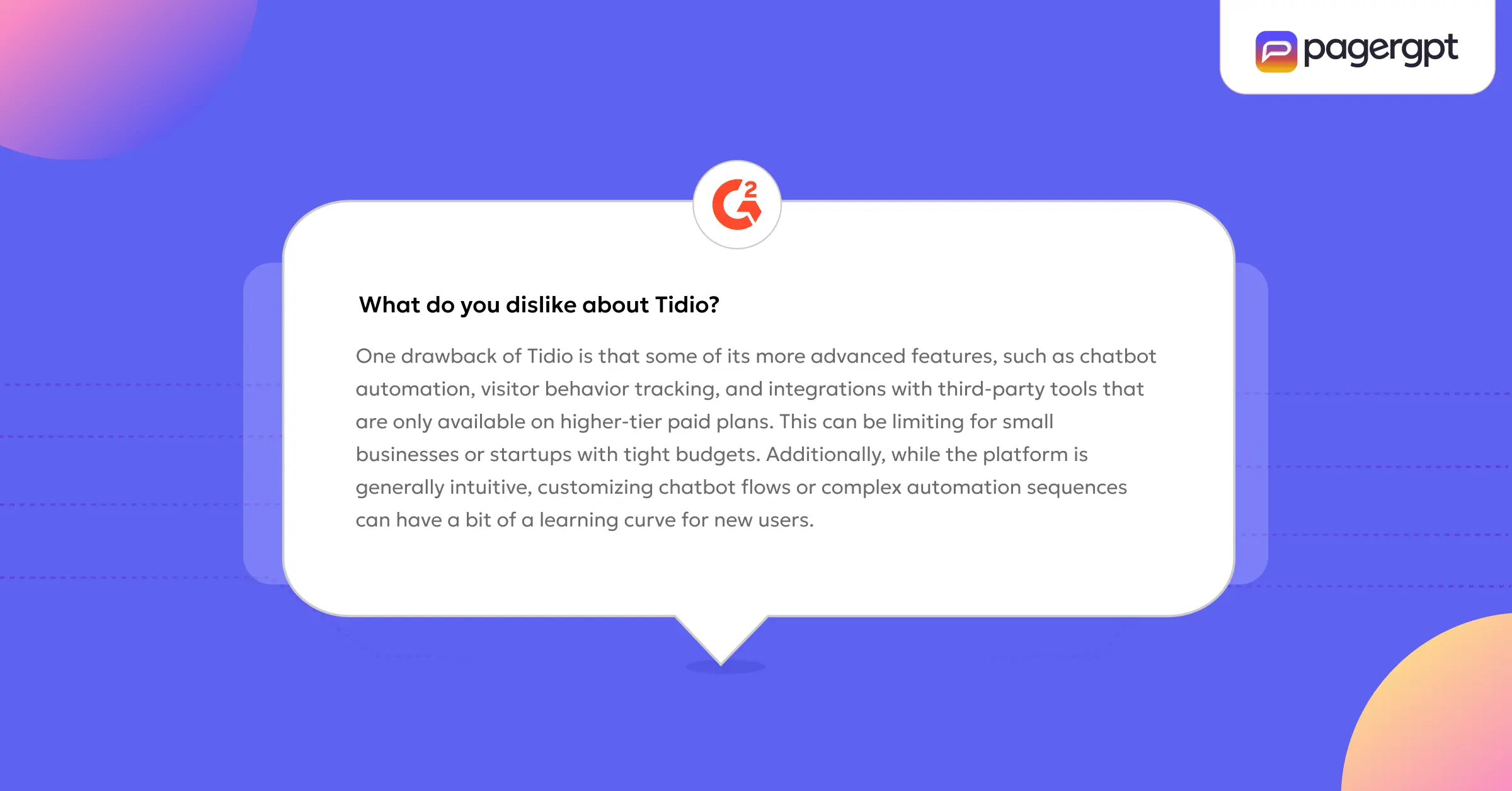
Tidio is a solid platform for managing customer communication, but some of its advanced features—like chatbot automation, visitor behavior tracking, and deeper third-party integrations—are locked behind higher-tier paid plans. For small businesses or startups with limited budgets, this can feel restrictive. While the interface is generally intuitive, building complex chatbot flows or automation sequences does come with a learning curve. Overall, Tidio delivers value, but smaller teams may find its best tools harder to access without upgrading.
Inconsistent mobile app experience
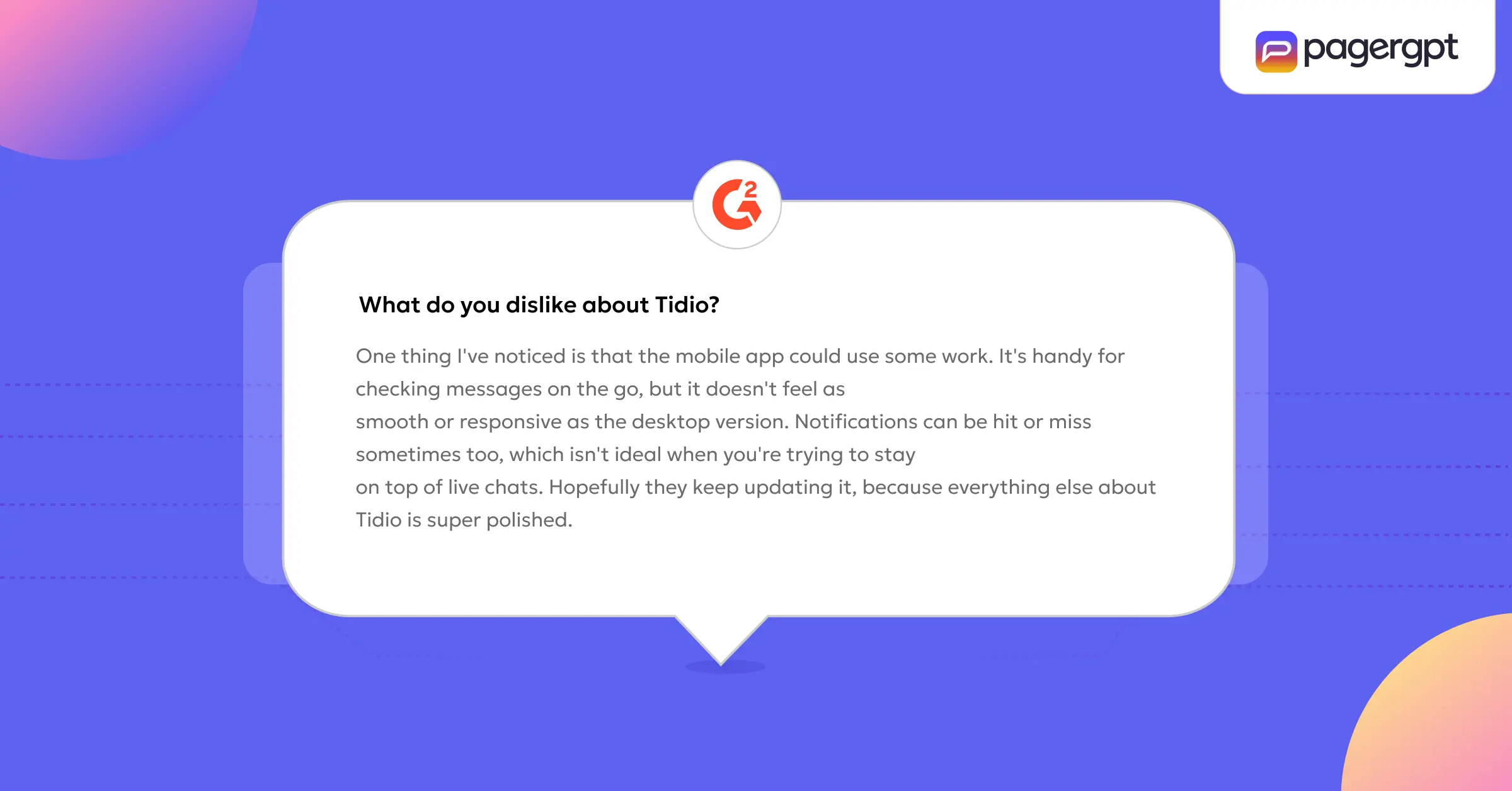
Tidio’s mobile app leaves room for improvement. It’s useful for checking messages on the go, yet it doesn’t feel as smooth or responsive as the desktop version. Notifications can also be inconsistent, which makes it harder to stay on top of live chats in real time. That said, the core platform is excellent, and with continued updates to the app, Tidio could become even stronger for teams that need support on the move.
Effort-intensive configuration
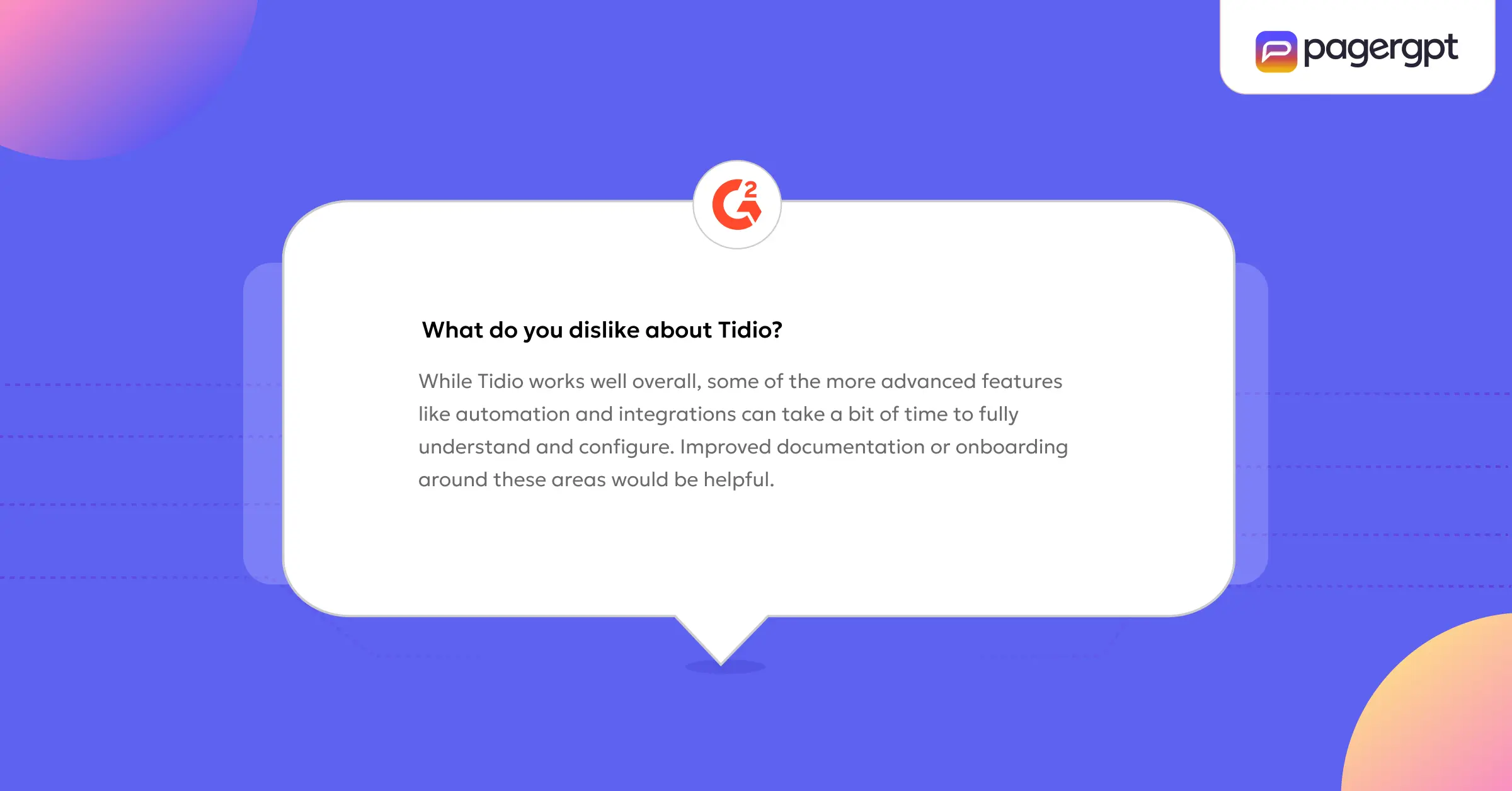
Some of its advanced features—like automation and third-party integrations—can take time to fully understand and configure. While the platform works well overall, improved documentation and more guided onboarding around these areas would make the setup process smoother. With a bit of extra support, Tidio could be even more accessible for teams new to AI-driven customer service.
Key features that define Tidio
Lyro AI Agent – Tidio’s flagship AI chatbot that can handle repetitive queries, resolve FAQs instantly, and escalate complex issues to human agents. It is multilingual, trained on your business data, and improves over time with real chat history and feedback.
Multilingual AI support – Lyro AI can understand and respond in 45+ languages, making it a strong choice for businesses serving international customers.
Chat widget translations – The widget itself comes pre-translated into 20+ languages, so customers can interact in their preferred language from day one.
Dashboard language options – The Tidio admin panel is localized into English, French, Spanish, Italian, and Portuguese for team accessibility.
Wide range of integrations – Tidio connects with over 120+ tools, spanning e-commerce platforms, CRMs, analytics, and marketing apps.
E-commerce integrations – Out-of-the-box support for Shopify, WooCommerce, WordPress, Adobe Commerce, and Shopware helps online stores streamline support.
CRM and marketing integrations – Compatible with HubSpot, Mailchimp, Klaviyo, Zoho CRM, and more (including thousands through Zapier).
Pre-built automation templates – Provides over 40 templates for tasks like abandoned cart recovery, FAQ responses, and lead generation.
Omnichannel support – Allows businesses to manage live chat, email, Messenger, Instagram, WhatsApp, and support forms from a single unified inbox.
Strengths and limitations of Tidio
Pros:
Faster customer responses – Lyro AI Agent handles FAQs instantly, reducing wait times and improving satisfaction.
Global reach – With support for 45+ languages and a pre-translated widget in 20+ languages, businesses can serve international customers without hiring multilingual staff.
Higher sales conversions – Automated cart recovery flows and lead-generation templates help capture more revenue.
Reduced support workload – AI automation filters out repetitive questions so human agents can focus on complex issues.
Affordable scaling – Transparent pricing makes it easy for SMBs to scale without the heavy costs of enterprise platforms.
Simple setup – Teams can launch a chatbot in minutes, avoiding the need for developers or technical onboarding.
Centralized communication – A single inbox combines live chat, email, and social channels, preventing lost messages.
Improved customer retention – Faster resolutions and personalized interactions build stronger relationships.
Business insights – Even with simple analytics, businesses get enough visibility into customer behavior to optimize support.
Cons:
Not ideal for enterprises – Lacks advanced customization and workflow automation needed by large corporations.
Limited helpdesk depth – The ticketing system is basic, which can slow down complex case management.
AI struggles with complexity – Lyro may fail on nuanced, technical, or multi-step queries, requiring frequent human handoff.
Dependency on third-party tools – Many advanced integrations rely on Zapier, adding extra costs and setup time.
Shallow analytics – Reporting is limited, making it harder for businesses to track performance at scale.
Scalability challenges – While great for SMBs, it may fall short when support volumes grow significantly.
Popular use cases of Tidio in real business
24/7 customer support – Businesses can provide round-the-clock responses with Lyro AI, ensuring customers get answers even outside office hours.
E-commerce support – Online stores use Tidio to recover abandoned carts, update order status, and guide customers through checkout.
Lead generation – Chatbots capture visitor details, qualify leads, and pass them to sales teams automatically.
Multilingual service – Companies serving global markets rely on Tidio’s 45+ language support to engage customers in their native language.
Customer retention – Personalized, fast responses improve satisfaction and loyalty, keeping customers from switching to competitors.
Omnichannel engagement – Support teams manage email, live chat, Messenger, Instagram, and WhatsApp from one dashboard, reducing missed opportunities.
SMB support automation – Small businesses without large support teams use Tidio to automate FAQs and free up human agents for complex issues.
Tidio pricing in 2025: Plans and value
Free – $0/month
Best for very small businesses just getting started with chat automation. Includes live chat, basic chatbots, helpdesk, and social integrations. Limited to about 50 handled conversations per month, 50 Lyro AI conversations, and up to 100 unique visitors for Flows. Comes with Tidio branding.
Starter – $24/month (annual billing)
Best for small teams wanting more control than the free plan. Offers 100 handled conversations per month, basic analytics, visitor tracking, and scheduling features. Still limited in automation and carries branding unless upgraded.
Growth – $49/month (annual billing)
Ideal for growing businesses that need more scale. Expands capacity to 250+ handled conversations per month (scalable up to 2,000). Includes advanced analytics, visitor page history, more Lyro AI and Flows usage, and better customization options.
Plus – $749/month
Built for larger teams that need dedicated support and enterprise-level features. Provides custom quotas for conversations, thousands of Lyro AI responses, dedicated customer success manager, departments, and multi-site support. Branding can be removed.
Premium / Enterprise – $2,999/month (custom pricing available)
Designed for large organizations requiring service-level guarantees. Includes effectively unlimited handled conversations, premium support, managed AI solutions, OpenAPI access, and advanced security/compliance features.
Best for small teams or solopreneurs testing AI chatbots. Includes 1 chatbot, 4,000 messages per month, 200 web pages, and 10 file uploads. Great for lightweight FAQ automation.
Best alternative to Tidio: how pagergpt compares
While Tidio is a popular choice for small businesses looking to automate support, it isn’t always the most scalable or cost-efficient solution. As companies grow, they often need more flexible integrations, predictable pricing, and smarter AI capabilities. This is where pagergpt steps in—offering a future-ready platform designed to handle customer support at scale without the hidden limits.
Messaging flexibility
Tidio applies strict limits on the number of conversations and Lyro AI interactions within each plan. Businesses often find themselves needing to upgrade quickly to avoid hitting caps.
pagergpt provides generous and scalable message credits across its plans. This gives teams more freedom to engage with customers without worrying about running out of quota or facing unexpected overage charges.
Integrations and workflows
Tidio integrates natively with popular apps like Zendesk, HubSpot, Messenger, WhatsApp, Instagram, Klaviyo, Pipedrive, and Mailchimp. It also supports APIs, webhooks, and Zapier connections, which allow data to flow into external systems. However, more complex automations—such as processing refunds, handling bookings, or writing back into CRMs—often require developer support.
pagergpt, in contrast, comes with no-code integrations for Shopify, Stripe, Zendesk, Freshdesk, Calendly, and more. It enables teams to automate e-commerce, payments, and support workflows instantly, making it more practical for businesses that want to act on queries, not just respond to them.
Multilingual capability
Tidio offers multilingual capabilities through its Lyro AI Agent and chat widget. The widget itself is pre-translated into over 20 languages, and Lyro AI can handle customer conversations in more than 45 languages. This makes it effective for basic international support, but translations may sometimes feel generic, and advanced customization across different languages can require extra setup.
pagergpt supports 95+ languages out of the box, offering much wider coverage for global businesses. Its AI can seamlessly translate and respond in multiple languages without sacrificing context or tone. For companies with diverse customer bases, this makes pagergpt a stronger solution for delivering consistent, localized support at scale.
Pricing and value
Tidio starts with a free plan but quickly increases in cost as businesses add conversations, AI usage, or advanced features. Many of its more powerful tools are only unlocked on higher-tier paid plans, which can be restrictive for smaller teams.
pagergpt offers a Magic Plan at $0/month, which includes generous sessions and unlimited messages. Its higher tiers remain affordable and transparent, ensuring businesses can predict costs as they grow without the steep jumps seen in Tidio’s pricing.
Accuracy and hallucination control
Tidio’s Lyro AI works well for handling FAQs and simple queries but can struggle with multi-step or complex conversations. Customizing advanced chatbot flows also requires a learning curve.
pagergpt is built with agentic RAG (Retrieval-Augmented Generation), allowing it to pull accurate, real-time answers directly from connected data sources. It also gives businesses more options to fine-tune AI behavior, offering deeper customization than Tidio.
Head-to-head comparison: Tidio vs. pagergpt
Feature | Tidio | pagergpt |
Integrations | Connects with Zendesk, HubSpot, Messenger, WhatsApp, Klaviyo, and others. Advanced workflows often require developer effort. | Offers no-code integrations with Shopify, Stripe, Zendesk, Freshdesk, Calendly, and more. Automates e-commerce, payments, and support instantly. |
Pricing | Free plan available, but costs rise quickly as conversations and AI usage grow. | Magic Plan at $0/month with unlimited messages and transparent, affordable pricing at higher tiers. |
Message Flexibility | Strict conversation limits per plan, forcing frequent upgrades. | Generous, scalable message credits with fewer restrictions, easier to scale. |
AI Accuracy | Lyro AI handles FAQs well but struggles with complex or multi-step queries. | Uses agentic RAG for more accurate, context-aware answers from live data sources. |
Multilingual Support | Supports ~45 languages, with chat widgets pre-translated into 20+. | Supports 95+ languages, delivering stronger global coverage for diverse markets. |
Dive deeper into the top alternatives to tidio — read our full guide and find the platform that best fits your support strategy.
Choosing the right AI agent platform in 2025
The comparison between Tidio and other AI support tools shows how different platforms cater to different needs. Tidio is excellent for small businesses that want a quick, no-code chatbot with live chat support, but its limitations around conversation caps, advanced features, and scalability can hold back growing teams. This is where pagergpt sets itself apart. With transparent pricing, generous message credits, multilingual flexibility, and advanced Agentic RAG for higher accuracy, pagergpt provides a future-ready solution that adapts as your business expands.
If you’re looking for a platform that delivers scalable, accurate, and cost-efficient customer support without hidden limits, pagergpt is a better alternative to Tidio.
👉 Try pagergpt today and discover how it can transform your customer support with accuracy, scalability, and cost efficiency.
FAQs
What is Tidio best used for?
Tidio is best for small businesses and e-commerce brands that need a simple, no-code chatbot and live chat solution. It’s affordable, easy to set up, and works well for automating FAQs and managing customer conversations in one place.
What makes pagergpt different from Tidio?
pagergpt goes beyond answering questions. It automates workflows like payments, refunds, and CRM updates with no-code integrations, supports unlimited messages, and uses Agentic RAG to deliver smarter, context-aware responses.
Does Tidio support multiple languages?
Yes. Tidio’s Lyro AI supports conversations in over 45 languages, and its chat widget is pre-translated into 20+. However, deeper multilingual customization may require extra setup.
Is Tidio free to use?
Tidio offers a free plan with limited conversations and chatbot usage. Advanced features and higher quotas are only available in paid plans.
Does pagergpt have a free plan?
Yes. pagergpt’s Magic Plan is completely free, offering unlimited messages with session-based limits. Paid tiers add more sessions, integrations, and customization options.
Which is better for scaling support teams—Tidio or pagergpt?
Tidio is great for getting started, but as businesses scale, conversation limits and tiered pricing can become restrictive. pagergpt is more future-ready, with transparent pricing, scalable message credits, and deeper integrations for growing teams.
Engage website visitors instantly,
resolve customer queries faster.
Do more than bots with pagergpt
About the Author

Senior content writer
Deepa Majumder is a writer who specializes in crafting thought leadership content on digital transformation, business continuity, and organizational resilience. Her work explores innovative ways to enhance employee and customer experiences. Outside of writing, she enjoys various leisure pursuits.
